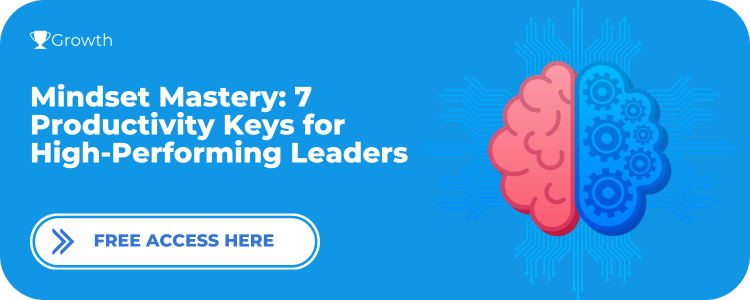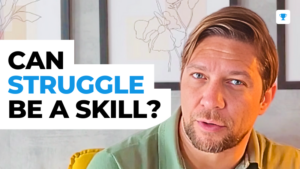
✅ FREE ACCESS: Mindset Mastery: 7 Productivity Keys For High-Performing Leaders
Have you ever found yourself in a situation where, despite your best planning, life took an unexpected turn, leaving you to navigate through the unknown?
What if I told you that the moments you felt lost and out of control could be transformed into keys to unlock your true path forward?
Let’s uncover how the entropy paradox can be a force for positive change, redefining your belief system and the way you see and interact with setbacks.
But before we get into it, make sure you grant your lifetime access to our free Workbook: Mindset Mastery: 7 Productivity Keys for High-Performing Leaders.
This is your chance to make the mindset shift you need to enhance your belief system by using the 7 mindset keys of the 1% top-performing leaders.
The Entropy Principle and Belief Systems
Imagine for a moment the universe, a vast expanse of space, stars, and galaxies, all bound by the laws of physics.
One of these laws is the concept of entropy, a principle suggesting that over time, everything tends towards disorder and randomness.
But what if I told you that this principle applies not just to physical systems but to the very fabric of your belief system?
In isolated systems, like the universe, entropy is always increasing.
This concept, rooted in thermodynamics, might seem a million light-years away from our daily lives, but it’s surprisingly relevant to the way we think, believe, and perceive the world.
You see, our belief systems are frameworks of principles, values, and assumptions through which we interpret our experiences and build our reality.
From the moment we’re born, we’re indoctrinated into a complex web of beliefs, shaped by culture, education, and personal experiences.
These beliefs guide our thoughts, actions, and decisions, creating a lens through which we see the world.
But here’s the thing: just like the universe, your belief system is subject to entropy.
Over time, they can become cluttered with contradictions, outdated assumptions, and irrelevant values.
Consider for a moment how belief systems have evolved throughout history.
Ancient societies held beliefs that seemed outdated in modern days but were critical for their survival.
Even today, the way digital age transforms our understanding and interaction with the world.
The traditional 9-to-5 job, a core belief for a successful career is being challenged by the rise of the gig economy, remote work, and digital nomadism.
They introduce ‘new information’ that disturbs the established ‘order’ of career paths, compelling individuals to reassess their career beliefs and adapt to a new economic landscape.
This brings us to a critical point: the dynamic nature of your belief system under the entropy principle is not a flaw but a feature of survival.
It’s what allows for growth, adaptation, and the evolution of human thought.
As James Gleick puts in his book, Chaos: Making a New Science:
“The butterfly effect is a concept that small causes can have large effects. In our lives, subtle shifts in our beliefs can lead to profound changes in our worldviews.”
Understanding the entropy of your belief system empowers you to navigate life more consciously and successfully.
Because It encourages questioning, learning, and adaptation, ensuring that your beliefs serve you in understanding the ever-changing world around you.
To embrace the entropy of your belief system as a positive force for growth, we’re going to explore 3 aspects of that pursuit:
- The Entropy Paradox of Belief Systems
- Adapting Your Belief System to Entropy
- How to Shape Your Belief System Through Entropy
That will lead the way to an ongoing process of growth and discovery, shaping a reality that reflects our deepest values and truths instead of being shaped by it.
The Paradox of Belief Systems
The first of the 3 aspects we’re going to explore to enhance our belief systems using entropy is The Paradox of Belief Systems.
The very entropy, or disorder, that seems to threaten the coherence of our beliefs can also be the catalyst for growth and the development of a more sophisticated understanding of the world.
At first glance, entropy within our belief systems appears as a force of disruption, introducing confusion and challenging our established ways of thinking.
It confronts us with contradictions, unanswered questions, and the unsettling realization that we may not have all the answers.
However, it’s precisely in these moments of disorder that the seeds of growth are sown.
The process of wrestling with uncertainty, re-evaluating our beliefs, and integrating new information compels us to adapt, leading to the evolution of our belief systems.
This evolution requires us to engage in what psychologist Robert Kegan refers to as ‘the process of making meaning,’ where we:
“Construct and reconstruct our understanding of the world in response to new experiences and insights.”
The growth induced by entropy in our belief systems mirrors the adaptive processes found in nature, where organisms evolve in response to environmental changes.
Just as biodiversity increases an ecosystem’s resilience, a diverse and adaptable belief system enhances our ability to navigate life’s challenges and uncertainties.
As our beliefs become more nuanced, we’re better able to understand and appreciate the perspectives of others, bridging divides and fostering a more inclusive and compassionate worldview.
As Carl Jung said:
“There is no coming to consciousness without pain.”
The discomfort of questioning and revising your beliefs is not just a necessary evil; it’s a vital part of your journey towards growth, understanding, and a more productive connection with the world around you.”
Adapting Your Belief System to Entropy
The second of the 3 aspects we’re going to explore to enhance our belief systems using entropy is Adapting Your Belief System to Entropy.
The introduction of new, organized information or experiences plays a critical role in maintaining or evolving a coherent belief system.
But why is this adaptation so important, and how can we consciously engage in it?
Firstly, let’s address the ‘why.’
In a world shaped by constant change, clinging to outdated beliefs can lead to cognitive dissonance, where our perceptions and realities no longer align.
This misalignment can hinder our ability to make informed decisions, navigate social complexities, and ultimately, thrive.
To avoid this problem, we must ensure our belief systems remain flexible, able to assimilate new information, and adjust accordingly.
It’s like updating the software on your device; without regular updates, it becomes less effective, unable to support new applications or protect against emerging threats.
Now, onto the ‘how.’
How do we consciously adapt our belief systems in the face of new evidence or perspectives?
Cultivate Openness
The first step toward adaptability is to maintain an open mind, willing to question and reassess your beliefs in light of new information.
The 2 most common ways of being fooled are believing everything you hear and denying everything you hear.
What do you do to avoid that trap? You ask questions. That will expose you to different viewpoints and perspectives.
Apply Multidimensional Perspectives
The second step toward belief system adaptability is to not accept information at face value.
Engage in critical thinking to evaluate the credibility, evidence, and logic behind new information or viewpoints.
How do you do that?
Keep the habit of applying a multidimensional perspective for things that require your evaluation.
- If something seems only positive, find at least one negative aspect of it.
- If something seems only negative, find at least one positive aspect of it.
In the book Experience and Education, Philosopher John Dewey remarked that:
“The most important attitude that can be formed is the desire to go on learning.”
By consciously engaging in this process, you can ensure your beliefs remain relevant, reflective of your current understanding, and supportive of your journey through the complexities of life.
In the Mindset Mastery Workbook, you will learn the 7 mindset keys of the world’s top-performing leaders to develop a successful belief system with science-backed principles and action-oriented steps.
By granting your free lifetime access to this workbook today, you will not only shape a productive belief system now but also, have access to all future updates at no cost.
How to Shape Your Belief System Through Entropy
The last of the 3 aspects we’re going to explore to enhance our belief systems using entropy is How to Shape Your Belief System Through Entropy
How, then, can we embrace this entropy, turning potential turmoil into a catalyst for growth?
Here’s a practical framework to guide you:
1. Embrace Uncertainty as a Growth Mechanism
Start by acknowledging that uncertainty isn’t an obstacle but a fertile ground for growth.
The discomfort you feel in the face of contradictory beliefs or new information is the first step towards expanding your horizons.
For instance, learning a new culture or philosophy that challenges your core beliefs isn’t just a test; it’s an opportunity to deepen your understanding of the world and your place within it.
2. Systematically Challenge Your Beliefs
Actively seek out experiences and information that challenge your existing belief system.
Engage with content that contradicts your viewpoints, not to incite internal conflict but to refine your beliefs.
This can be as simple as reading books from authors with opposing views or engaging in conversations with people of diverse backgrounds and ideologies.
Each of these interactions introduces a bit of ‘entropy’ into your belief system, prompting you to reassess and adapt.
3. Adopt a Multidisciplinary Approach to Learning
The principles of entropy are not confined to thermodynamics; they are reflected in economics, sociology, psychology, and beyond.
By understanding how disorder and chaos theory apply across different domains, you can develop a more nuanced and resilient belief system.
Consider how the unpredictable nature of stock markets or the complex dynamics of social movements can offer insights into managing personal entropy.
4. Celebrate Milestones
Recognize and celebrate the milestones in your journey towards a more adaptable belief system.
Whether it’s changing your stance on an issue, embracing a new habit that aligns with updated beliefs, or simply becoming more open-minded, each step is a testament to your growth.
Acknowledging these milestones reinforces your commitment to continuous learning and personal evolution.
In essence, shaping your belief system through entropy is a dynamic process of deconstruction and reconstruction, where the goal is not to find absolute answers but to cultivate a belief system that’s resilient, adaptive, and reflective of your ongoing journey through the complexities of life.




